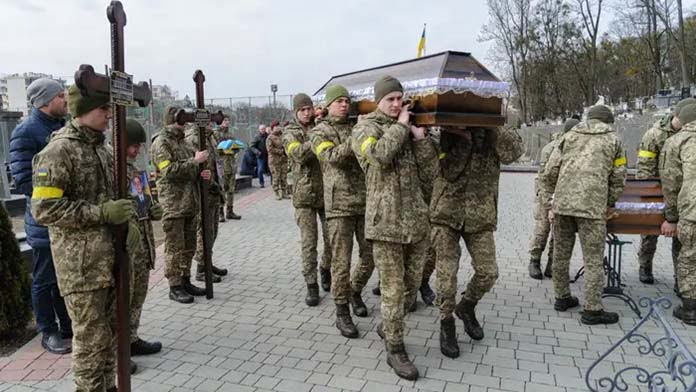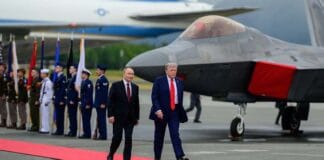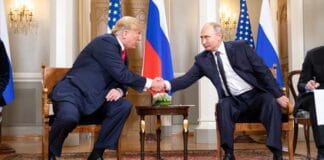Over two months into the much vaunted Ukrainian counter-offensive there has been no serious movement of the front lines. But as the body count continues to rise, reconstruction plans have made it clear that Ukraine is now totally beholden to Western interests.
Major Ukrainian objectives such as severing the land-bridge between Russian-controlled areas in the east and Crimea are nowhere in sight.
In August Ukraine launched more of its reserves into the offensive but so far there is little to show for it.
Attempting to push into heavily fortified Russian-controlled areas littered with minefields has exacted a devastating toll. According to US and European officials, Ukraine lost 20 per cent of the weapons it sent to the battlefield in the first two weeks of the offensive alone.
While official figures are not released, many thousands have been killed or injured on both sides. The expansion of cemeteries has become a macabre measure of the death toll. The Economist reported a Ukrainian military chaplain saying one cemetery in Dnipro was “three times the size of what it was before the invasion.”
Estimates in the Wall St Journal are that between 20,000 and 50,000 Ukrainians have lost a limb as a result of the war, a figure approaching that suffered by Britain and Germany in the First World War.
The US, NATO and Australian Prime Minister Anthony Albanese have poured billions of dollars worth of weapons into the conflict. But Ukraine and its people are paying the price for a proxy war between the US-led NATO alliance and Russia. Heavy losses have led to an increasingly brutal scramble to push more of the Ukrainian population onto the front lines.
The New York Times reports that:“Videos of unwilling draftees being manhandled into cars by military recruitment officers, nightclubbers being served papers and stowaways on trains and trucks are a regular feature on Ukrainian news.”
Zelensky has had to sack regional recruitment chiefs country-wide after they allowed the rich to buy their way out of service through payments of up to $15,000.
The West’s costly and dangerous role in fuelling the war is justified as a defence of democracy and freedom for Ukraine. But the 2023 Ukraine Recovery Conference in London in June exposed the predatory nature of Ukraine’s supposed allies.
Predatory reconstruction
The World Bank estimated that Ukrainian recovery and reconstruction would cost $632 billion after the first year of the war.
According to the plan outlined at the conference, money for reconstruction will be raised through huge debts that will plague Ukraine for decades, and allowing in profit-motivated private interests.
Notorious private equity company Blackrock and leading US bank JP Morgan have been tasked to raise capital for reconstruction. Almost 500 global businesses have signed the Ukraine Business Compact to profit from rebuilding the shattered country.
Ukraine has been granted conditional loans that ensure Western interests are served. Interest will be waived on a new $30 billion EU loan to reduce the debt burden—but in return “compliance with political prerequisites” is required.
This will bind Ukraine to policies which will make life worse for ordinary people—decimating union rights, promoting privatisation including of prime farm land and giving free rein to foreign capital.
Zelensky is an enthusiastic supporter of this. He has banned all left-wing political opposition and as Ukrainian commentator Gregory Afinogenov reported: “Zelensky’s party has pushed through laws that have effectively destroyed the right to collective bargaining as well as other labor protections in Ukraine. It has also implemented pension law reforms… amounting to radical cutbacks.”
Their vision for Ukraine is as “a gigantic special economic zone on the fringes of Europe”.
Peace summit
The world’s poor are paying the price as the imperialist powers behind the war continue to hinder peace.
The Jeddah peace summit in Saudi Arabia in August was used to push Zelensky’s ten point peace plan amongst countries from the global South. Unlike major Western powers, they have been far less enthusiastic about the war.
Zelensky’s peace plan is effectively based on a complete defeat of Russia, restoring Ukraine’s pre-2014 territory. Unsurprisingly no real progress came from the summit. A delegation of African leaders made their own, more pro-Russian peace proposal in Moscow in July.
The fact delegations from over 40 countries attended indicates the widespread concern about the conflict and its ramifications across the world.
For example, the collapse of the Black Sea grain deal in July means grain from Ukraine will no longer move freely out of Ukrainian ports. Ukraine is a major grain producer and the end of the deal saw world grain prices spike immediately.
A strong anti-war movement East and West is urgently needed to stop the devastation inside and outside Ukraine.
By Adam Adelpour






